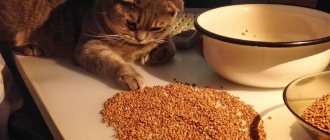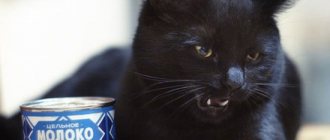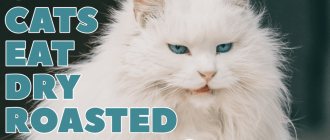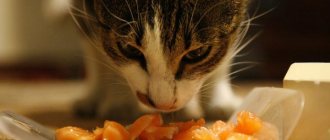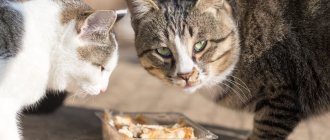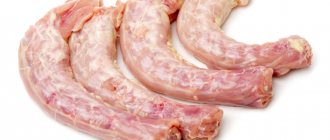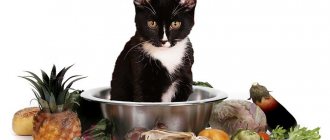Cats, along with dogs, are the most common pets. They, like any predators, have certain physiological needs; their body needs the amino acid arginine, which is found only in proteins of animal origin. Thus, a cat’s diet should consist of protein food at least 80%. However, a cat’s diet must include cereals, cottage cheese and kefir, vegetables and fats.
Fats of plant and animal origin can be classified as individual pet food groups. It is important to know that cat food should contain more fat than dog food, but less than human food.
The body of cats, especially at a young age, perfectly digests and absorbs fats, and kittens that receive a sufficient amount of fats grow and develop much faster. Cats need to be given both animal and vegetable fats.
Vegetable fats that are beneficial for cats include:
- Sunflower oil.
- Olive oil.
- Mustard oil.
- Linseed oil.
- Hemp oil.
Animal fats that are beneficial for cats are:
- Beef fat.
- Butter.
- Fermented milk fats.
- Fish fat.
Can cats have oil?
Veterinarians allow the cat to be given oils of animal and plant origin to saturate the pet’s body with vitamins and fatty acids. Only dosed consumption will have a positive effect. If you overeat, your cat may experience diarrhea, lethargy, and an allergic reaction. Veterinarians prohibit giving this natural product in its pure form, only in combination with cereals, vegetables, meat and fish.
Fish
Giving cats fish must be dosed, observing certain norms. The cat's digestive system is not accustomed to the composition of amino acids and minerals contained in fish (in the wild, cats do not catch their own fish), which can cause kidney disease and urolithiasis.
Feeding your cat raw fish and river fish is prohibited; it is advisable to choose low-fat varieties of sea fish and boil it first. River fish, and even raw fish, contains a large number of helminths and substances that interfere with the normal absorption of nutrients, unlike boiled fish. Also, most river fish contain a specific enzyme, thiaminase, which destroys vitamin B1.
When choosing fish, the owner should focus on the following types: salmon, pink salmon, salmon, hake, catfish, mackerel tuna.
Can cats?
Vegetable oil: which one is useful?
Prohibited types include avocado, coconut and grape seed oil, as they can cause an allergic reaction and loose stools.
Veterinarians advise including vegetable fats in your pet’s diet, because they are rich in tocopherol and Omega-3 and 6 polyunsaturated acids. Thanks to the intake of these substances, the condition of the fur improves, the claws become stronger, pathologies of the reproductive system are prevented and the pet’s activity increases. It is especially useful to include vegetable oil in the diet of a pregnant cat, but it should be introduced gradually, starting with 1 drop. The total recommended volume is calculated as 1.5 g of product per 1 kg of cat weight. Beneficial species that should be given to animals include the following:
Flaxseed product is approved for consumption by animals.
- olive;
- from flax seeds;
- sunflower;
- hemp;
- from mustard seeds.
It is better to combine vegetable fats with soups, cereals, boiled or stewed vegetables. Sunflower oil should not be given to kittens under 1 year of age. It is also not recommended to consume it raw, however, if there is difficulty in defecation, you can pour a third of a teaspoon into the cat’s mouth with a syringe. Olive oil, on the contrary, is more useful if it has not been subjected to heat treatment. Veterinarians advise watering food with it - fish, meat or vegetables. You cannot use vegetable fats when frying, because regular consumption of such products will cause liver pathologies in the cat. You cannot give oils with kefir, milk and homemade yogurt at the same time, as this will cause gastrointestinal upset.
Butter
It is not recommended to give a product of animal origin in its pure form; it must be combined with natural food. Butter improves the condition of the coat, prevents skin diseases and pathologies of the heart muscle, thanks to the high content of retinol, cholecalciferol, tocopherol, and saturated fatty acids. It is especially useful to give it to British, Burmese, Siberian and Himalayan cats.
If a cat is suspected of having an intestinal obstruction, then constipation can be treated with oils only after consultation with a veterinarian.
The simultaneous intake of vegetable and animal fats will negatively affect the functioning of the gastrointestinal tract. The product should also be discarded if the pet is weakened. According to veterinarians, fats of plant and animal origin should be present in the same ratio in a cat’s diet. However, if after consuming the cat’s health worsened, a skin rash or scabies appeared, the product should be discarded and the deficiency of vitamins and fatty acids should be replenished with special supplements from the pet store.
Source
Contraindications for use
Vaseline oil is an affordable, effective mild laxative that veterinarians recommend for use for constipation in cats, dogs and other pets. Externally, it is a transparent liquid with an oily consistency, without taste or odor.
Once inside, Vaseline oil is not absorbed, but only forms a slippery film, gently enveloping the walls of the intestines and digestive tract. By thinning the stool, Vaseline oil facilitates their passage. In addition, the film protects the intestinal walls from harmful toxic decay products, preventing them from being absorbed, thereby preventing intoxication of the body.
Vaseline oil is absolutely harmless for cats and other warm-blooded animals, since it is not absorbed by the walls of the gastrointestinal tract. It has a pronounced mild laxative effect and normalizes the act of defecation.
The cat cannot go to the litter box due to constipation
Before using petroleum jelly, you should consult a veterinarian - the doctor will examine the animal, conduct the necessary tests and determine whether there are any strict contraindications for treatment with this remedy. For example, the drug is prohibited in cases where constipation is caused by blockage of the intestines with solid objects or a very large tumor.
- intestinal ulcer,
- intestinal bleeding of unknown etiology,
- complicated by late stages of hemorrhoids.
The laxative is not recommended for course use for rickets and osteoporosis caused by hypovitaminosis of fat-soluble vitamins (A, D and E). Vaseline oil will prevent the medications you take from being absorbed and will cause even greater complications of these diseases.
Vaseline oil should not be given to pregnant cats to avoid causing premature birth.
When a cat has problems with bowel movements, which drug should be chosen so that it is effective and at the same time harmless? Not everyone knows that Vaseline oil for constipation in cats is a very effective and relatively safe remedy.
We invite you to read: Review of various cat breeds, distinctive features and character traits
Vegetable oils in a cat's diet
Vegetable oils are the richest source of vitamin E, which is beneficial for coat and claws, as well as for the reproductive and genitourinary systems. Vegetable oils are given to a cat, starting with a couple of drops and gradually increasing to the norm, at the rate of 1.5 grams per 1 kilogram of the animal’s weight. They are best mixed with vegetables, but in no case with dairy products.
Vegetable oils that can be given to a cat:
- unrefined sunflower; olive; mustard; linen; hemp.
When preparing food, you should avoid adding exotic oils - coconut, avocado, grape seed. Any exotic oil can cause allergies and diarrhea in a cat.
The beneficial properties of vegetable fats are due to the presence of large amounts of vitamin E in them, thanks to which the animal’s fur and claws remain healthy; it is also vitamin E that pregnant cats need most.
It is very important to give vegetable oil to your cat correctly; the oil should be introduced into the diet with one drop, gradually increasing its amount at the rate of one and a half grams of oil per kilogram of the cat’s weight. Oil can be added to vegetable dishes, but under no circumstances should it be given at the same time as fermented milk products.
Animal fats
Animal fats contain vitamins such as A, D, E, and if they are deficient, the animal will have a faded coat, dermatitis and heart problems may occur. You cannot mix several types of animal fats; they should be alternated. You also need to introduce them into your cat’s diet very carefully, starting with a drop and increasing to one and a half grams per kilogram of the animal’s weight.
Is it possible to give cats oil (vaseline, olive, butter, etc.)
The first and effective aid in this case is the use of Vaseline oil. It is always available in a regular pharmacy. However, it should be used only if you are 100% sure that the cat does not have an obstruction. Veterinarians advise giving your pet Vaseline oil as follows: the first time in a dose of 20 grams, pouring it into the mouth with a syringe without a needle.
It is tasteless, so the cat will not resist much. Next, you need to wait three hours, and if during this time the animal does not go to the toilet, then give another 5 grams, and after an hour the same amount. The total dose of oil should not exceed 40 grams for a cat whose weight does not exceed 5 kilograms. As practice shows, after the first dose of oil, within an hour or two, the cat goes into the litter tray and is freed from feces, from which an unpleasant odor emanates.
After the cat's condition has eased, she should be given another 2 grams of oil and the next day 1 gram twice a day.
Owners should understand that using Vaseline oil for constipation is an emergency measure. It is forbidden to constantly resort to it.
As for enemas, they, of course, can be done on cats, but it will be difficult for an unprepared person to cope with this task. After all, for a cat this procedure is unpleasant and uncomfortable. He will tolerate the Vaseline infusion much more calmly.
Systematic brushing of a cat, especially a long-haired one. Periodic cleansing of the cat’s gastrointestinal tract with special food or pastes. They are called cleansing phytomines for distilling wool. You can find such products at any veterinary pharmacy. Regularly feeding the animal with vegetables. They are rich in plant fiber and cleanse the pet's stomach and intestines well.
These simple tips will help caring owners protect their pets from constipation.
Vaseline oil (not to be confused with regular petroleum jelly) is a mild laxative that stimulates intestinal motility and also effectively softens stool. Cats and people often have similar ailments, sometimes constipation becomes such a problem - a condition in which the animal cannot go to the toilet for several days.
In these cases, many experts recommend using Vaseline oil - a drug that gently and delicately lubricates the intestinal walls, which helps remove feces from the body.
However, before giving your cat Vaseline oil, you need to make sure that it is suffering from constipation, and not, for example, intestinal obstruction. Obstruction is a much more serious symptom that is associated with the formation of a mechanical obstruction in the intestine, which most often requires medical intervention.
Veterinarians call constipation in cats the absence of bowel movements for 3-4 days, provided that in normal condition the animal goes to the toilet every day. This unpleasant phenomenon for a pet can be provoked by improper nutrition: for example, cats that eat dry food suffer from constipation less often than those that eat natural food.
For example, constipation in cats is often caused by regular consumption of boiled liver, consumption of rice, as well as the presence of chicken cartilage or bones in the diet. But raw liver, on the contrary, weakens; porridge, as well as boiled vegetables and fermented milk products, also contribute to normal digestion.
If such trouble nevertheless befell your pet, then what is the correct way to give it Vaseline oil? This can be done without much fear: it is absolutely harmless to cats, it looks like an ordinary transparent liquid that has neither taste nor smell. You can buy it at a regular pharmacy, in case of such critical situations, it is better to make sure that it is always in your first aid kit.
Of course, before starting any treatment, it is better to first consult with a specialist; he will prescribe the required dosage of the drug and also examine the animal. If there is no opportunity to consult with a veterinarian, then you can start treatment on your own, the main thing is not to overdo it with dosages.
Milk products
One of the most controversial items on a cat's menu. Most professionals do not recommend giving it, but many owners use it in their cat's daily diet.
The presence of dairy products on the menu rather depends on the cat’s lifestyle. If from childhood she was fed milk, cottage cheese, kefir and other fermented milk products, then she will not have diarrhea, and even to some extent this will be beneficial for her. And if a significant amount of time has already passed since the end of the lactation period, and the cat did not eat dairy products at that time, in this case, indigestion and profuse diarrhea are guaranteed.
Another way to use sunflower oil
Many people are familiar with this delicate problem. Poor nutrition, a sedentary lifestyle, and the intestines refuse to perform their functions as they should. In this case, you can go to the pharmacy and buy expensive laxatives or try to make do with home remedies that are always at hand. Today we want to tell you about sunflower oil. This remedy for constipation is very effective, and is always at hand.
Each child is individual; some children will refuse fruit puree or cottage cheese, feeling an unusual taste. What to do if other drugs are banned and you can only use sunflower oil for constipation? Reviews from mothers say that sunflower enemas have a very good effect.
A very good option would be sunflower oil for tummy massage. A baby's skin can absorb everything that comes in contact with it. Do not forget that the movements should be very light and gentle. Children like this procedure, so there will be no problems with massage. Do it daily, and most likely your baby will not suffer from constipation.
The most common vegetable oil in a cat's diet is sunflower oil. It is better not to give it raw, but to use it as a basis for preparing cat food, the main thing is that its quantity corresponds to the weight of the cat. Thanks to the consumption of sunflower oil, your pet will become more active, and its coat will become shiny and soft.
In addition to using sunflower oil as a dietary supplement, it can help if your cat is constipated. In order to relieve your pet of constipation, you need to give it from a syringe, without a needle, 1/3 teaspoon of oil. This procedure very quickly normalizes the animal’s stool. It is better not to give sunflower oil to very young kittens; it is better to introduce it into the diet after six months of age.
Meat
A product that should be present in any diet of a predatory animal, but its type must be clearly defined.
Fatty types of meat should not be given to cats, especially for cat breeds such as Scottish Fold and British. When there is an excess of lipids, inflammatory processes occur in the pancreas.
It is advisable to choose turkey, chicken and quail meat. It is possible to introduce horse meat and rabbit meat, but pork and beef, and moreover lamb, are prohibited.
It is also important to give not tenderloin, but trimmings - the meat should have veins and tendons, since meat is pure protein, and the veins are collagen, which a cat in the wild receives from the paws, beaks and joints of birds and mice.
Experts do not recommend feeding raw meat to your domestic cat, as there is a high risk of various infectious diseases until the meat has been heat-treated. You should not give your pets smoked or fried meats.
Mechanism of action
Doctors confirm that there really can be an effect. The mechanism is very simple; sunflower oil helps with constipation indirectly. The body reacts to the intake of pure fats by releasing bile, which, in turn, is a stimulator of peristalsis. Other vegetable fats also work this way, and the effect of sunflower fat is the weakest. Olive oil has the most pronounced choleretic effect. You can also use castor oil, but it is not often at hand.
How to read labels?
The content of trans fats in products is usually indicated in the composition. It should say "vegetable fat", "cooking fat", "partially hydrogenated vegetable fat" or "partially hydrogenated fatty acids". Vladimir Bessonov
explains that with complete hydrogenation, trans-isomers are not formed, but the consistency of the oil itself becomes hard as a candle and unsuitable for confectionery purposes. In the composition, trans fats are indicated as a percentage (that is, it indicates how much they occupy from the total amount of fat contained in the product).
A course to reduce trans fats in Europe
Manufacturers in developed countries are making every effort to reduce the content of trans fatty acids in their products. The first country to pass a law restricting trans isomers was Denmark in 2003. Gradually, other states joined it - Sweden, Switzerland, Hungary, Norway, etc. In Germany, the restriction is advisory in nature.
Vladimir Bessonov
also says that technologies are already emerging that make it possible to produce products without trans-isomers of fatty acids. This technology is called "transesterification". It allows you to obtain oil of the desired consistency, which will not contain trans fats. Also, palm oil can be used as a safe analogue, which initially has a texture convenient for food production and is subject to hydrogenation to a lesser extent.
What you should know
Sunflower oil is a very popular remedy for constipation; people recommend it to each other, without taking into account that the condition of the body can be very different for everyone. A spoonful of oil a day will not harm a healthy person; it will only slightly stimulate intestinal motility. But this rule only works if a person does not suffer from chronic, atonic constipation, irritable bowel syndrome, or cholelithiasis. In this case, you can safely experiment with sunflower oil, trying out its laxative properties.
Proper nutrition for constipation
And we continue to consider whether sunflower oil will help with constipation. Colon cleansing according to folk recipes is carried out only with an unrefined product. It contains the full amount of all useful substances and a minimum of chemical additives. Dosage also matters. Just one spoon on an empty stomach is recommended to relieve constipation. Some people advise starting with a tea cup and then gradually adding more.
Whether you can drink sunflower oil if you have constipation is determined individually. After use, you should eat food within one and a half hours. The main effect is softening and enveloping. You can regularly use the oil to make salads. Some people add it to porridge.
Do not forget that the oil must be consumed together with water. It is this duet that ensures the best bowel movement. Immediately after waking up, you should drink a tablespoon of oil and a glass of water. After about an hour you can have breakfast. During the day, be sure to drink 2 liters of water, this will improve the functioning of the gastrointestinal tract.
If the problem occurs regularly, then one morning dose will not do. Then in the evening we recommend kefir with sunflower oil for constipation. Taken two hours before bedtime, this mixture will improve the functioning of the gastrointestinal tract. To do this, you will need a glass of kefir and a tablespoon of oil, mix them and drink. Oil helps in almost all cases of constipation. In the spastic form, it has a relaxing effect, and in the atonic form, on the contrary, it improves peristalsis, that is, it promotes bowel movements.
To treat constipation, proper nutrition is very important. Be sure to include stewed vegetables in your diet. The best option would be broccoli and other types of cabbage, tomatoes and pumpkin, rutabaga. The ideal salad for your intestines would be beets with prunes, dressed with oil.
Safe dosage
Sunflower oil on an empty stomach for constipation should be used every morning, and only systematic use can bring positive results. A safe dose is 20 ml, that is, a tablespoon. Consuming large amounts of oil can cause you to go overboard on calories, which means you risk gaining excess weight. However, this is not the only thing you need to know:
- A large dose of sunflower oil can cause stomach cramps, diarrhea, nausea or severe heartburn. Those people who have chronic diseases of the gastrointestinal tract should be especially careful. An overdose may result in exacerbation of cholecystitis and colitis. Therefore, if you have chronic diseases, do not self-medicate; it is better to consult a doctor. If you are taking blood thinners, you should discuss taking the oil on an empty stomach with your doctor, as they together may increase the risk of bleeding. For diabetic patients, oil consumption should only take place against the backdrop of constant sugar control. Daily use may cause an allergic reaction depending on individual inclination.
The most important disadvantage of natural feeding
Calculating a natural feeding ration is a procedure that requires a serious approach, and the calculations are quite complex. Pet owners often simply do not have enough knowledge about the nutritional needs of the cat's body. In addition, the declared content of various substances in products is the average temperature in the hospital, and with a natural type of food you cannot be completely sure that the pet is getting everything it needs.
Also, when calculating the diet, it is necessary to take into account all the characteristics of the animal, the presence of chronic diseases and physiological conditions (pregnancy, lactation, active growth, age-related changes).
When feeding natural food, it is not recommended to make large reserves of food; it is advisable to prepare a portion for 1-2 doses. However, it is possible to prepare food for a longer period by using portion freezing, but this is a task that also requires special knowledge from the animal owner.
If there is a deficiency or excessive content of some important elements, there is a risk of developing dangerous chronic diseases - kidney failure, disorders of the cardiovascular system, liver disease and other pathologies. In addition, when choosing natural components of future food, it is important to be confident in their quality.
Before you start feeding your cat natural food, you need to decide which products must be present in the food, and which type is preferable for a particular type of pet.


